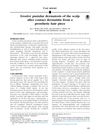 33 citations,
June 2016 in “Pediatric Dermatology”
33 citations,
June 2016 in “Pediatric Dermatology” Some congenital hair disorders improve in childhood or with treatments like minoxidil and retinoids, while others like Netherton syndrome and trichothiodystrophy have a poor prognosis.
 32 citations,
November 2018 in “Anais Brasileiros de Dermatologia”
32 citations,
November 2018 in “Anais Brasileiros de Dermatologia” In Brazil in 2018, the most common skin issues were acne, photoaging, and nonmelanoma skin cancer, with treatments often including topical medications and sunscreen.
 20 citations,
May 2016 in “Journal of Cosmetic Dermatology”
20 citations,
May 2016 in “Journal of Cosmetic Dermatology” Low vitamin D receptor levels found in hair loss patients; topical vitamin D treatment suggested.
 19 citations,
May 2021 in “Clinical, Cosmetic and Investigational Dermatology”
19 citations,
May 2021 in “Clinical, Cosmetic and Investigational Dermatology” Minoxidil and finasteride are the best for non-scarring hair loss; more research is needed for scarring hair loss treatments.
19 citations,
August 1998 in “Journal of the American Academy of Dermatology” Hair loss can signal serious health issues, not just cosmetic concerns.
19 citations,
October 1988 in “Clinics in dermatology” Retinoids might help hair grow and improve hair loss treatments.
 17 citations,
August 2015 in “Expert Opinion on Pharmacotherapy”
17 citations,
August 2015 in “Expert Opinion on Pharmacotherapy” The document concludes that oral finasteride and topical minoxidil are effective for genetic hair loss, while other treatments for different types of hair loss show promise but need more research.
 14 citations,
July 1987 in “Dermatologic Clinics”
14 citations,
July 1987 in “Dermatologic Clinics” The document concludes that treating female hair loss should target reducing excess androgen and blocking its effects on hair follicles, with the best treatments being hormonal therapy, adrenal suppression, and topical minoxidil.
7 citations,
February 2019 in “Veterinary medicine and science” An American Bully with a genetic skin condition improved significantly with specific topical treatments.
6 citations,
December 1987 in “Mayo Clinic proceedings” Retinoids are effective for severe acne and psoriasis but can cause serious side effects and birth defects.
1 citations,
January 2019 in “Journal of the Egyptian Women's Dermatologic Society (Print)” Minoxidil 2% is more effective for female hair loss, but botanicals have fewer side effects.
 1 citations,
July 2018 in “Elsevier eBooks”
1 citations,
July 2018 in “Elsevier eBooks” Heredity and hormones cause common hair loss, and topical minoxidil is the first recommended treatment.
January 2023 in “Pharmaceutics” AA–TF#15 significantly promotes hair regrowth and could be an effective treatment for androgenic alopecia.
September 2022 in “Dermatologic Therapy”  11 citations,
July 2017 in “Expert Opinion on Investigational Drugs”
11 citations,
July 2017 in “Expert Opinion on Investigational Drugs” New hair loss treatments may include topical medications, injections, and improved transplant methods.
 151 citations,
May 2014 in “American Journal of Clinical Dermatology”
151 citations,
May 2014 in “American Journal of Clinical Dermatology” Effective treatments for male pattern baldness include oral finasteride and topical minoxidil, while topical minoxidil is best for female pattern baldness.
 4 citations,
April 2018 in “Journal of Investigative Dermatology”
4 citations,
April 2018 in “Journal of Investigative Dermatology” Hydroxypinacolone retinoate is a potent anti-aging ingredient for skin that is more effective and less irritating than other forms of retinoids.
 9 citations,
March 2017 in “JAAD Case Reports”
9 citations,
March 2017 in “JAAD Case Reports” A woman's scalp condition improved with specific ointment after a hair piece caused skin issues.
 22 citations,
March 2018 in “American Journal of Clinical Dermatology”
22 citations,
March 2018 in “American Journal of Clinical Dermatology” New acne treatments show promise as alternatives to traditional therapies.
 7 citations,
June 2019 in “Australasian Journal of Dermatology”
7 citations,
June 2019 in “Australasian Journal of Dermatology” Elderly men with a scalp condition healed in about 26 days using specific creams and dressings, with no return of the condition in 6 months.
 6 citations,
October 2018 in “Drug safety - case reports”
6 citations,
October 2018 in “Drug safety - case reports” Alitretinoin may cause irreversible hair curling as a side effect.
 2 citations,
January 2015 in “Springer eBooks”
2 citations,
January 2015 in “Springer eBooks” Early diagnosis and aggressive treatment are crucial for Cicatricial Alopecia, and treatment effectiveness varies among patients.
 1 citations,
April 2018 in “Journal of Investigative Dermatology”
1 citations,
April 2018 in “Journal of Investigative Dermatology” Fzd2 is important for skin and hair development through various signaling ways.
 1 citations,
May 2017 in “Journal of The American Academy of Dermatology”
1 citations,
May 2017 in “Journal of The American Academy of Dermatology” A woman's hair grew back after stopping acitretin for psoriasis and getting steroid treatment, and low vitamin D might be linked to alopecia severity.
 1 citations,
July 2015 in “British Journal of Dermatology”
1 citations,
July 2015 in “British Journal of Dermatology” Imiquimod improved skin pigmentation in most patients with xeroderma pigmentosum and may prevent further skin cancer, but some treatments can have side effects.
 1 citations,
December 2011 in “Journal of The American Academy of Dermatology”
1 citations,
December 2011 in “Journal of The American Academy of Dermatology” The book concludes that treating acne scars requires a variety of methods and patience, with no single best way to classify or treat them.
 July 2023 in “Nasza Dermatologia Online”
July 2023 in “Nasza Dermatologia Online” More research is needed on CCCA in children, especially Black and Asian adolescents.
 July 2018 in “Elsevier eBooks”
July 2018 in “Elsevier eBooks” Scalp psoriasis can cause different types of hair loss, with some patients developing permanent hair loss, and treatment may be stopped due to skin reactions.
 March 1987 in “Journal of The American Academy of Dermatology”
March 1987 in “Journal of The American Academy of Dermatology” Oral spironolactone and isotretinoin are effective for treating acne.
 June 1996 in “Archives of Dermatology”
June 1996 in “Archives of Dermatology” Minoxidil, tretinoin, and finasteride may help hair regrowth in mild to moderate androgenetic alopecia.






















